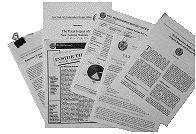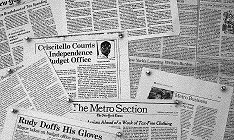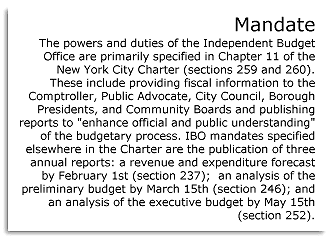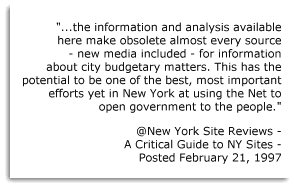From the Director For public agencies like the Independent Budget Office, annual reports provide an opportunity to report back to our stakeholders-the people who live and/or work in New York City-who we are, what we have accomplished, and how we spent taxpayers' dollars over the last year. If you don't have the time to read this entire report, it can be summarized in the following three sentences.
When I first started work in early 1996, the prospect of the agency surviving through its first year was far from certain. The agency had no employees other than myself, lacked formal appropriations, and was located in borrowed office space. Although the existence of the agency had been opposed for nearly seven years by City Hall, both the Mayor and the City Council ultimately complied with a State Supreme Court order and provided funding for IBO within a few weeks of my start date and we were finally on our way. In fiscal year 1997, our first full year of operation, IBO quickly established itself as a professional, non-partisan organization capable of performing first-rate economic and budgetary analysis. Our work products ranged from calculating the potential costs to the City of federal welfare reform, to measuring the economic benefits and costs of reducing certain local taxes, to illustrating how the City would fare under a state proposal to reduce property taxes earmarked for education. Through such work, IBO has had a practical effect on the legislative process such as helping to ensure that the City will receive an equitable share of state tax relief. It is exactly this kind of impact, benefiting all New Yorkers, that makes the existence of this agency so critical for the City. As we move into our second year, many challenges await us. We will continue to explore ways to expand the number of elected officials using IBO on an ongoing basis. We will strive to make our work products understandable and accessible to governmental officials and the public. We will continue our quest to get timely information from City Hall and mayoral agencies-a particularly challenging endeavor. And we will work to influence policies and decisions made at the federal, State, and City levels that affect New Yorkers. IBO was established to be the "People's Budget Office." Through the tremendously hard work of IBO's truly dedicated staff, I hope you will agree that we are on the right path toward earning this designation. Please feel free to contact us if you have any comments, questions, or suggestions for IBO work products in the year ahead.
|
 IBO's Mission IBO's MissionTo provide non-partisan budgetary, economic, and policy analysis for the residents of New York City and their elected officials and to increase New Yorkers' understanding of and participation in the budget process. |
|
History of IBO - A Seven-Year Wait During the summer of 1989, the New York City Charter Revision Commission proposed changes in the City's governance, to be submitted to voters on Election Day 1989. Among the reforms proposed by the Charter Commission was the creation of an Independent Budget Office (IBO) that would provide Council members, borough presidents, community boards, and the public with expert budget analysis independent of that provided by the Mayor's Office of Management and Budget (OMB) and the Council's Finance Committee. The Charter Revision Commission believed that since knowledge is power, the IBO would put other elected officials on a more equal footing with the mayor and the Council's leaders. In order to ensure that IBO had adequate resources and could not be eliminated through defunding, the proposed Charter guaranteed IBO a budget not less than 10 percent of the budget of OMB.
Voters approved the proposed changes to the City Charter in November 1989, paving the way for the establishment of IBO. From 1990 to 1995, however, successive mayoral administrations and the City Council did not approve funding to allow for the actual start of the office. Several elected officials and community organizations sued in court to compel the City to fund and establish IBO. As a result of two lawsuits, in the fall of 1995, the City agreed to create the IBO and approve partial-year funding for the office in fiscal year 1996. On February 20, 1996, Douglas Criscitello began work as IBO's director and first employee. He was chosen through a process specified in the Charter. Candidates were screened by a ten-person Advisory Board (appointed by the Comptroller and Public Advocate) whose broad membership includes private citizens with expertise in economics, finance, and public administration. Final selection of the director was made by an appointment committee consisting of the Public Advocate, the Comptroller, the Speaker of the City Council (representing the Council), and the Bronx Borough President (chosen to represent the five Borough Presidents). In the first few months of operation, IBO had only a few employees and was forced to contend with small and temporary space at 2 Lafayette Street. By July 1996, however, the agency had secured rental space at 110 William Street designed for the full complement of about 35 IBO employees. An open house was held in October 1996 at IBO's new offices to introduce as many members of the interested public as possible to the agency's staff and work plans and to strengthen its relationship with a broad cross-section of potential clients. |
|
What does IBO do? IBO provides professional, non-partisan analysis of New York City's budget and economy. As directed by the City Charter, the Independent Budget Office is mandated to publish three reports concerning New York City's budget. In addition, IBO is also responsible for a wide array of work products ranging from informal responses to official queries about the budget to comprehensive economic and fiscal analysis of major issues confronting the City. The publications listed below encompass IBO's work products from its first year of operation.
|
|
 |
New York City's Fiscal Outlook
Analysis of the Mayor's Budgetary Proposals
Analysis of the Mayor's 1998 Executive Budget |

 |
School Tax Relief and Education Aid Proposals: Impacts on New York City
Would Clothing Sales Tax Cuts Pay for Themselves?
Reductions in the City's Hotel Occupancy Tax Rate: The Impact on Revenues |
 |
IBO Analysis of Board of Education Funding Trends
Private and Public Funding for New York City Parks, 1987-1996
|
 |
Public OutreachThe primary role of IBO's public outreach efforts is to provide public information on budget and policy issues facing New York City. Our objective is to open up the City's budget process and to make it more accessible and understandable to both elected officials and the public. In our first year, public outreach has taken on many forms including: liaison work with elected officials, community boards, civic and neighborhood associations, the media, and other organizations; creation of IBO's web site; a newsfax (Inside the Budget); a "Tax Receipt" service; a "Budget Hotline"; and presentations to various community groups. The following summarizes IBO's major public education activities over this past year. |
| Inside the Budget How can anyone keep track of the myriad issues facing the City budget? More importantly, who has time to read all the reports, papers, studies and news stories on City budget issues? The IBO has created a bi-weekly newsfax, Inside the Budget to provide our readers with brief articles (usually 300-400 words) on various issues about the City's budget. The newsfax highlights important fiscal issues facing the City, summarizes IBO publications, lists reports released by other agencies and/or organizations, and announces schedules for preliminary and executive budget hearings. It also provides coverage of the preliminary budget hearings to enable people to keep up with the developments at agency hearings. |
 |
 |
No Taxation Without Explanation Where do your tax dollars go? In order to answer this question, our "Tax Receipt" service provides an itemized listing of how much an individual taxpayer pays-in actual dollars and cents-for specific federal, New York State, and New York City services (eighty in all). The service provides an easy, effective way of getting this information into the hands of taxpayers and provides an opportunity for taxpayers to access this information 24 hours a day, seven days a week. |
| Information Anytime In February 1997, IBO launched its web site (www.ibo.nyc.ny.us). The site contains a directory providing the names and telephone numbers of all IBO staff. When New Yorkers have a question on a City budget matter, they can either visit our web site or call the relevant IBO staff member directly for an answer.
|
 |
 |
Budget Hotline By April 26th every year, the Mayor releases an executive budget. This represents the final opportunity for elected officials and the public to debate the proposed City budget for the upcoming fiscal year. In many cases, it is difficult to find out information on particular programs. Our "Budget Hotline" gives callers an opportunity to obtain budget information needed on service delivery and funding levels for various City programs and agencies. Through the Hotline, callers have the opportunity to talk to IBO staff who can help them decipher the voluminous budget documents issued each year. |
| Elected Officials and the Public During the year, IBO responded to 30 formal requests for detailed analysis and reports from City Council members and other public officials, not-for-profit organizations, individuals, and community boards. Scores of informal inquiries were handled via telephone conversation, meetings, or written responses. In addition, public testimony was presented to legislative bodies in New York City and Albany as noted below.
|
|
Media Coverage The opening of the Independent Budget Office after several years of litigation and the agency's initial work during its first year of existence received significant coverage in the media. IBO was the subject of, or mentioned in over one hundred stories in the print and electronic media. In addition, IBO staff frequently responded to technical inquiries from journalists covering City budget and policy issues. The media plays an important role in helping IBO fulfill its mandate to enhance official and public understanding of the budget.
IBO's work was covered in the five major daily newspapers (New York Times, New York Post, Daily News, Newsday, Staten Island Advance); major weekly publications (Crain's New York Business, New York Observer, Village Voice); financial newspapers (Bond Buyer, Fixed Income Daily); wire services (Reuters, Associated Press, Dow Jones News Service); and, several weekly ethnic and neighborhood papers. IBO staff were interviewed many times for television and radio news broadcasts. We also sat for more in-depth interviews on Cityscape on WFUV, New York Close-Up on New York 1 News, New York Beat on WNYC, and Money Works on WBIS-TV. Some IBO work also received specialized coverage. Our study on clothing sales tax cuts was covered in depth in Women's Wear Daily, and IBO's analysis of school tax relief proposals was covered in the Legislative Gazette in Albany. Another major piece appeared in the New York City Partnership's journal Home Economics. It featured IBO's perspectives on the School Tax Relief (STaR) proposal in contrast to the Governor's views. Finally, IBO's interactive Tax Receipt service received national attention in Governing and Kiplinger's Personal Finance magazines. |
 |
Public Presentations As part of our Charter mandate to inform the public about municipal finances, IBO staff made presentations to the following groups during its first year. |
  |
American Jewish Congress • Association of Black Charities • Bank Street College • Bronx Borough Board • Bronx Community Board 10 • Bronx Mental Retardation and Developmental Disabilities Residential Committee • Brooklyn Borough Board • Center for Women in Government, State University of New York at Albany • City Project • City University Graduate Center • Columbia University, School of International and Public Affairs • Flushing YMCA • Human Services Council • LaGuardia Community College • Manhattan Borough Board • Manhattan Community Board 6 • Manhattan Solid Waste Advisory Board • Mitchell-Lama Council • New York City Partnership and Chamber of Commerce • New York State Network for Economic Research of The Nelson Rockefeller Institute of Government, State University of New York at Albany • Northern Manhattan Collaborates • Northern Manhattan Improvement Association • Northwest Bronx Community and Clergy Coalition • Organization of Waterfront Neighborhoods • Parks Council • Public Works Forum • Queens Borough Board • Queens Community Board 4 • Queens Community Board 9 • Staten Island Borough Board • Vassar College • Washington Irving High School • Women's City Club • Woodrow Wilson School of Public Policy, Princeton University • Young Public Policy Committee, UJA-Federation of Jewish Philanthropies |
|
Reactions to IBO's Work While reaction to our work has been overwhelmingly positive, our efforts have occasionally been met with mixed reviews. |
|||
 |
On our October 1996 report entitled The Fiscal Impact of the New Federal Welfare Law on New York City: "...city and state officials have spent months analyzing [the new welfare law]. Now they have the insights of the new agency, which has just reached this conclusion: 'The Act's impact on the New York City budget will ultimately depend on the decisions of state and city officials, the performance of the local economy and the behavior of thousands of individuals is response to the new system.' ...In other words, they don't have a clue." Daily News, editorial, November 1, 1996. "The conscientious work of the budget office proves the value of expert, nonpartisan analysis for policy makers reviewing complex options." The New York Times, editorial, November 4, 1996. |
On our June 1997 report entitled Would Clothing Sales Tax Reductions Pay for Themselves?: "Giuliani called the report 'dead wrong' and dismissed the budget agency as 'a useless office' that issues 'second-rate' economic reports." Daily News, June 27, 1997. "The [study] is a thoroughly professional analysis of the topic. The methods are the right ones; little is done that is based on subjective judgment; and all of the relevant considerations are taken into account. ...it is an excellent example of good economic reasoning and quantification, and deserves to be received as the most reliable study we are likely to see." Professor Dick Netzer, New York University. |
On IBO generally: "There is no reason for an Independent Budget Office. And, they put out silly reports like this because offices that have no reason for their existence put out silly reports to get attention." Mayor Giuliani on WABC's "Live from City Hall" June 27, 1997. "The IBO has been doing a fine job in monitoring the budget process, crunching its own numbers to arrive at revenue estimates and informing the public." Citizens Union, Searchlight on the City Council, June 1997. |
| Access to Information The City Charter authorizes IBO to "secure such information, data, estimates, and statistics from the agencies of the city as the director determines to be necessary for the performance of the functions and duties of the office, and such agencies shall provide such information, to the extent that it is available, in a timely fashion." This provision is the most powerful authority provided to IBO. Shortly after IBO was established, however, a memorandum was sent to City agency heads requiring them to direct all IBO inquiries to the Mayor's Office of Management and Budget (OMB) "to develop a coordinated response to these requests." Rather than ignoring the memorandum-which would have required IBO to find particularly courageous agency staff willing to speak with us-we decided to work within the constraints imposed by the memo and to channel our requests for information through OMB. |
|
 |
IBO has been and continues to be willing to work within the constraints imposed by the memo only to the extent it facilitates our ability to perform our Charter-mandated duties. Over the next year, we plan to expand the scope of our work to include programmatic budget analysis, linking budget and related non-financial data, so that we can show the public how well the City spends its money. Such an approach will require City agencies to provide much more information to IBO than was furnished over the past year. Given the fact that getting data from agencies has sometimes been an arduous and lengthy process, we have a long way to go before we feel comfortable that the administration's existing "coordinated response" process supports IBO in discharging its Charter-mandated responsibilities. |
 |
|
| Finances |
|
| IBO Operating Budget for Fiscal Year 1997 | |
| Authorized Funding | $2,536,466 |
| Uses of Funding | |
| Salaries | 1,705,230 |
| Office Furniture and Equipment | 190,990 |
| Rent | 157,170 |
| Computer Automation and Supplies | 66,761 |
| Office Supplies | 15,350 |
| Advertising | 3,375 |
| Travel (local and inter-city) | 7,607 |
| Printing | 16,942 |
| Professional Services | 73,420 |
| Temporary Services | 6,231 |
| Postage | 12,548 |
| Telecommunications | 26,902 |
| Utilities | 4,593 |
| Books and Subscriptions | 39,586 |
| Equipment Rentals | 12,986 |
| All Other | 15,449 |
| Total Spending | $2,355,140 |
| Ending Surplus* | $181,326 |
| * Adjustments are made after the end of the fiscal year that reduce the surplus by a modest amount. | |
IBO Staff during Fiscal Year 1997 |
|
Office of the Director
General Counsel Intergovernmental Affairs IBO Administration Public Outreach |
Douglas Criscitello Herbert Block Elizabeth Boghossian Paul Greaves Richard Greene Kevin Koshar Terri Matthews Timothy Mulligan Frank Posillico Indera Segobind Amy Bachrach* David Roberts* |
Budget Analysis Division
Expenditure Analysis
Expenditure Analysis
Expenditure Analysis |
C. Spencer Nelms Jr. Ian Brown Jonathan Cortell Eric Dixon Jenell Horton Deanice Jenkins Patrick M. Killackey Elizabeth Lynam Paul Lopatto Ritta McLaughlin Bernard O'Brien Martha Prinz Sofia Quintero Joyce Sun Deborah Ahrens* Sarah Monroe* Nancy Penksa* |
Economic Analysis Division
tax revenues Impacts of changes in tax policy |
Ronnie Lowenstein David Belkin Michael P. Jacobs Luan Lubuele Stephen Mark Beth Moodie George V. Sweeting |
 * Former staff members |
|
Advisory Board, Consultants, and Interns during Fiscal Year 1997 |
|
| Advisory Board | Frank Mauro, Chair Jack Krauskopf, Vice Chair John Burton* John Eatwell Dall Forsyth* Ronald Gault* David Gordon* Stanley Hill Ray Horton Sidney Lirtzman Carol O'Cleireacain Margarita Rosa * term expired |
| Graduate Student Interns | Sarah Coyle Jessica Greene Jeff Meli Will Morrow Ryan Poscablo Charles Swartz Georgia Wallen |
| Consultants | Howard Chernick Frank Fioramonti David Johnson |
| High School Interns | Anthony Jackson Christine Martinez Juan Marchany |
| Special Thanks
Herbert Block Paul Greaves Kevin Koshar Ritta McLaughlin Ryan Poscablo IBO would like to thank and acknowledge the Public Advocate's Office, Office of Payroll Administration, the Department of Citywide Administrative Services and the Comptroller's Office for their support and assistance during our first year. Annual Report Design: Don Battershall, Susan Shaw |
Independent Budget Office
Email Address: ibo@ibo.nyc.ny.us
Douglas A. Criscitello, Director
110 William Street, 14th Floor
New York, New York 10038
Phone # (212) 442-0632
Fax # (212) 442-0350



